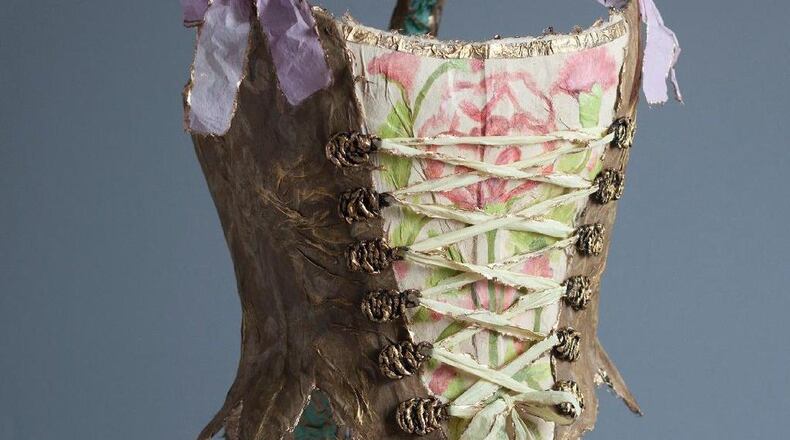"Re-Writing History" is as succinct a pairing of title and content as they come. In Brooklyn artist Fabiola Jean-Louis' solo show at Alan Avery Art Company, the photographer and sculptor takes a revisionist approach to the past, suggesting that all of those delicate ladies and gentlemen seen in classical 15th- through 19th-century oil paintings may have been propping up a very indelicate, even grotesque system of elision and violence behind their aristocratic trappings, elaborate costumes and bucolic settings.
Inspired by old master paintings by the likes of Fragonard, Titian and Vermeer, Jean-Louis essentially flips the script. She replaces uniform, alabaster damsels clutching flowers and moodily draped with lush curtain backdrops with a far more diverse, richer array of women, the kind more often reduced to background odalisques and servants in art history’s past.
Much like artists Kehinde Wiley or Omar Victor Diop, Jean-Louis is in the business of both questioning the uniformity of our visual culture — and its glorification of only the dominant European ruling class — while also pondering a disturbing element of many classical paintings, which balance refined beauty against scenes of war, rape and destruction.
For Jean-Louis, that violence has a different flavor, informed by the hidden history of racist violence: The bodices of her subjects’ dresses tell stories of lynchings, and in the background of her work “They’ll Say We Enjoyed It,” a pair of half-dressed white aristocrats attack a terrified naked black woman.
Look closely at Jean-Louis’ paintings, and many contain hidden messages of subversion and resistance. In “Madame Beauvoir’s Painting,” a beautiful young woman contemplates a painting of a black slave whose back is a topographic map of scar tissue. Her own gown has been embroidered with a similar pattern that replicates that damaged tissue. And in what may be “Re-Writing History”’s most sublime work, “Whisper of a Revolution,” another candy box beauty, whose face is as velvety and pristine as the soft lines of her dress, clutches roses in a gesture of feminine delicacy. But Jean-Louis has inserted a wonderfully sly detail in the tiny black soldier hidden behind a tree who we imagine is whispering insurrection into her ear.
Viewers may long for a little more grit and bite to Jean-Louis’ work as seen in “Whisper of a Revolution.” At her weakest, Jean-Louis can traffic in surface prettiness — as in “Conquistador II,” featuring a Vermeer beauty with liquid eyes and a dreamy expression — replacing one form of inert femininity with a more diverse and enlightened one. In her best work, Jean-Louis astounds with her surreal ecstasies blending painting and photography in works that fool the eye in the most delightful way.
In addition to her photographic nods to traditional oil paintings, there are also alternative histories contained in Jean-Louis’ supplementary sculptural works, ornate dresses and embellished slippers that she crafts entirely from paper and features in her photographs. Those gossamer paper costumes are their own metaphor: showing the fragility of history, of femininity and sacred institutions. But displaying those paper garments can feel like a magician giving away her best trick. In person, these elaborate garments with their lush lace collars and bodices laced with delicate paper ribbons disrupt the marvelous stagecraft in her photographs.
“Re-Writing History” strikes a variety of different notes, moving between profundity and a superficial loveliness that can at times leave one craving more. Granted, some might argue that Jean-Louis’ vision of an alternative loveliness recast as egalitarian and enviable is revolution enough.
ART REVIEW
“Re-Writing History: Fabiola Jean-Louis”
Through Jan. 5, 2018. 10 a.m.-6 p.m. Tuesdays-Fridays; 11 a.m.-5 p.m. Saturdays. Free. Alan Avery Art Company, 656 Miami Circle NE, Atlanta. 404-237-0370, www.alanaveryartcompany.com.
Bottom line: This Brooklyn artist's pretty photographs and delicate paper dresses speak to an ugly, racist history.
About the Author
Keep Reading
The Latest
Featured





